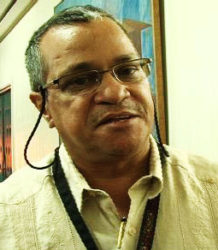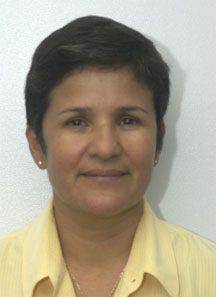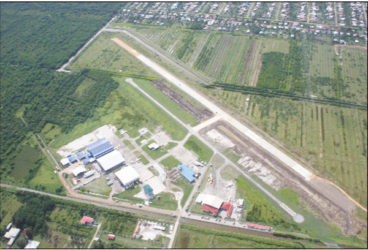Even as Monday’s ceremony appears to have signalled an end to the battle by the National Air Transport Association (NATA) to prevent the former Ogle International Airport facility from being renamed the Eugene F Correia International Airport, there are clear signs that the feuding between the management of Ogle Airport Inc and several of the other operators there may persist for some while longer.
This week, Michael Correia, President of the Board of Ogle Airport Inc the body charged with the running of the newly renamed facility and Captain Gerry Gouveia, CEO of Roraima Airways and Vice President of the recently created NATA exchanged harsh words that have left observers to wonder whether the two men can still work together seriously as members of the Aircraft Owners Association of Guyana (AOAG).

On Monday, Correia used the occasion of the renaming of the airport to charge that Roraima Airways and all of the other operators had contributed “little or nothing” to the development of Guyana’s second international airport. “While he purports to be a major player in the development of the airport, he never was,” Correia said of his competitor.
On Wednesday, Gouveia, who is currently out of Guyana on business, responded, asserting that while Correia was attacking him “personally” his comments continued to be “the voice of the nine disgruntled Guyanese aircraft operators.”
In his response to Correia’s assertion that “Roraima Airways and all the other companies” had contributed “little or nothing” to the development of Ogle, Gouveia said that on its own, Correia’s company Trans Guyana Airways “could never have been awarded the lease from the government; the government agreed to award us the lease only because of who we are, both individually and collectively, it had nothing to do with how much money any of us had.”
Gouveia told Stabroek Business that at the start of the partnership, “We agreed to operate with trust and good faith as the hallmarks of our relationship even as we continued to be competitors. We agreed that never would anyone of us have more say than the other.”
Gouveia, who along with Air Services Ltd (ASL) General Manager Annette Arjoon-Martins had spearheaded the setting up of NATA to help lobby for an official change of heart on the re-naming of the airport, told this newspaper on Tuesday that from his perspective the renaming of the airport by President David Granger had effectively ended what he described as “flurry of comments” on the issue made in the weeks prior to the renaming of the facility. “However strongly the majority of the aviation sector would have felt about the issue, the airport has been renamed and, personally, I think that it would be entirely inappropriate to persist in a public exchange on the matter,” Gouveia said.


However, he insisted that there was good reason to fear that the management of what is now the Eugene F Correia International Airport could become “even more dysfunctional” unless government now moves to exercise “more vigilant oversight at Ogle.” Gouveia said he had read the presentation delivered by Public Infrastructure Minister David Patterson at the renaming ceremony and had been encouraged by the undertakings in the presentation including the announcement that a review is being done of the operations of Ogle Airport Inc.
This is against the backdrop of Patterson’s announcement that while the operational section of the facility has been functioning smoothly “that does not mean that there is no room for improvement.” Gouveia said it was “particularly significant” that the Public Infrastructure Minister had said that the government’s review would be “focusing on its current lease of the facility to OAI” and not only that the exercise will be done fairly but that the renaming of the airport “will not affect the outcome or direction of government” in the matter of the review process.
Gouveia said that “both Roraima and NATA” would be “absolutely prepared” to “work with the findings of the review body.”
Gouveia said Patterson’s forthright assertion that the concerns of those opposed to renaming of the airport “cannot be dismissed as something without merit” represented “a direct rebuttal” of the attempts by Correia to make it seem as if his concerns and the concerns of the other operators at Ogle were irrelevant and trivial.
He said he considered the presentation by Patterson to be “hugely significant” since it suggested that “for all the smokescreens which Correia had attempted to throw up” during the renaming ceremony “the message from the government is that they are aware of the concerns of the rest of the aviation community and that they would be probing those concerns. At the end of the day it seems that the rest of the aviation community will get its opportunity to express its concerns in an appropriate environment regarding the situation at Ogle.”

Both Gouveia and Arjoon-Martins said that the Airport Review Panel (ARP) is a body created “to review progress on the obligations of both parties” under this existing agreement and to “make recommendations relating to the performance of those obligations.” Part of the purpose of the ARP is to seek to identify “any difficulty perceived by either party in the performance of the obligations of both parties.”
Gouveia told Stabroek Business that what NATA was hoping was that the ARP would recognize some of the management-related difficulties at Ogle that were troubling most of the stakeholders.
Correia, meanwhile, in his address at the renaming ceremony, said he believed that what he described as the “obvious division in the aviation sector” was due to “the lack of respect and adherence to the rule of law.”
He alluded to what he said were circumstances in which the “legitimate aviator is placed in an unfair an unacceptable position when faced with unsafe and unfair competitive practices like the overloading of aircraft and transporting illegal fuel allowed across the border from Venezuela,” a practice which he said “costs the state billions of dollars and inevitably erodes legitimate businesses.”
At the same time the OAI head also alluded to the need for qualified flight operations inspectors and for a proactive Guyana Civil Aviation Authority “to halt this illegal activity.”




